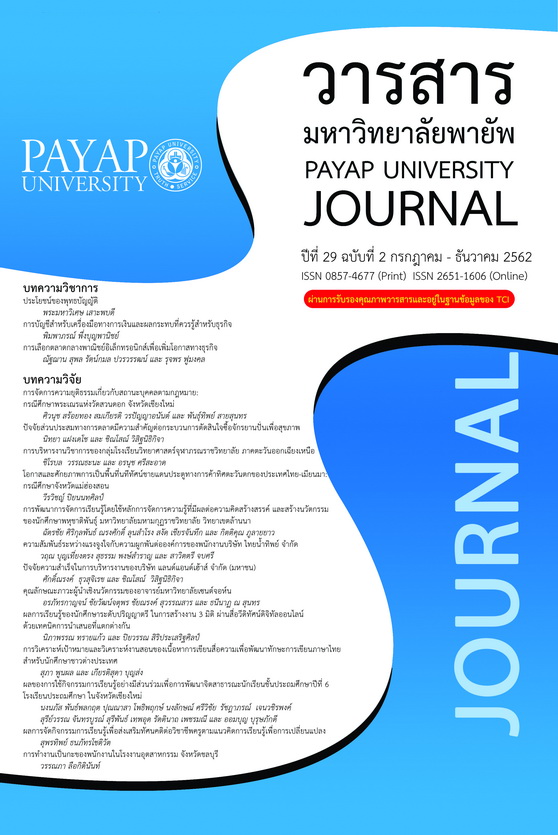การทำงานเป็นกะของพนักงานในโรงงานอุตสาหกรรม จังหวัดชลบุรี
Main Article Content
บทคัดย่อ
การศึกษานี้เป็นการวิจัยเชิงคุณภาพ มีวัตถุประสงค์เพื่อศึกษาผลกระทบและแนวทางการปรับตัวในการทำงานเป็นกะของพนักงานในโรงงานอุตสาหกรรม เพื่อให้เกิดความสมดุลในชีวิตและการทำงานในเชิงประจักษ์ ผู้ให้ข้อมูลสำคัญ คือ พนักงานที่ทำงานเป็นกะในโรงงานอุตสาหกรรม จังหวัดชลบุรี จำนวน 22 คน เก็บรวบรวมข้อมูลโดยใช้แบบสัมภาษณ์กึ่งโครงสร้าง และใช้การสุ่มแบบเจาะจง ผลวิจัยพบว่า การทำงานเป็นกะมีผลกระทบด้านสุขภาพ ซึ่งประกอบด้วยอาการปวดศีรษะ ปัญหาด้านระบบทางเดินอาหาร ร่างกายอ่อนล้าเนื่องจากนอนหลับไม่เพียงพอ และปัญหาด้านสุขภาพจิต นอกจากนี้ยังพบว่าการทำงานเป็นกะของพนักงานยังมีผลกระทบด้านครอบครัว สังคมและการดำเนินชีวิต ซึ่งประกอบด้วยด้านความสัมพันธ์ภายในครอบครัว และด้านการเข้าสังคม สำหรับแนวทางการปรับตัวของพนักงานที่ทำงานเป็นกะในเบื้องต้น คือ การปรับเวลานอน งดอาหารประเภทคาเฟอีน การรับประทานอาหารให้ตรงเวลา และออกกำลังกายอย่างเหมาะสม รวมถึงการปรับเปลี่ยนทัศนคติเชิงบวก หากิจกรรมคลายเครียด และระบายเรื่องทุกข์ใจให้ผู้อื่นฟัง รวมถึงจัดทำตารางเวลาในการทำกิจกรรมกับครอบครัวและเพื่อนให้ชัดเจน และปฏิเสธการทำงานล่วงเวลา สำหรับข้อเสนอแนะจากการศึกษา พนักงานอาจพิจารณาเรื่องการเลือกที่อยู่อาศัยที่ใกล้โรงงาน การดูแลสุขภาพกายและจิตใจ และการจัดตารางเวลาว่างให้สอดคล้องกับสมาชิกในครอบครัว ส่วนสถานประกอบการอาจพิจารณาจัดสิ่งอำนวยความสะดวก เช่น ห้องพักระหว่างเข้ากะ ที่พักอาศัยในบริเวณโรงงาน เป็นต้น รวมถึงการจัดสวัสดิการค่าตอบแทนพิเศษเพิ่มเติมให้กับพนักงานที่ทำงานเป็นกะ การจัดกิจกรรมเชื่อมสัมพันธ์ระหว่างพนักงานและครอบครัวมากกว่าปีละ 1 ครั้ง
Article Details
เอกสารอ้างอิง
ฉัฐญาณ์ วงศ์รัฐนันท์. (2562). Shift Work ผลกระทบจากทำงานเป็นกะ. กรุงเทพฯ: สำนักงานกองทุนสร้างเสริมสุขภาพ.
ณัฐพล ประจวบพันธ์ศรี. (2552). ทำงานเป็นกะอย่างไรให้มีความสุข. กรุงเทพฯ: โรงพยาบาลวิภาวดี.
พงศ์เทพ วิวรรธนะเดช. (2558). ผลกระทบต่อสุขภาพจากการทำงานเป็นกะ (Health Effects of Shift-Work), สืบค้นเมื่อ 15 มิถุนายน พ.ศ.2562. http://www.med.cmu.ac.th/dept/commed/2015/images/22.pdf.
ไพบูลย์ ธรรมสถิตย์มั่น. (2555). การเพิ่มกะในการทำงาน. วารสารการบริหารคน, 33(3), 66.
วนิชา ดีพัฒชนะ. (2554). ผลกระทบจากการทำงานกะกลางคืนต่อการดำเนินชีวิต: กรณีศึกษา พนักงานบริษัทโฮม โปรดักส์ เซ็นเตอร์ จํากัด (มหาชน). วิทยานิพนธ์ปริญญามหาบัณฑิต คณะสังคมสงเคราะห์ศาสตร์ มหาวิทยาลัยธรรมศาสตร์.
สมบูรณ์ ทศบวร. (2561, 31 สิงหาคม). ห่วงคนทำงานเป็นกะ พักผ่อนน้อยเสี่ยงเกิดโรคเรื้อรังเพียบ. เดลินิวส์, 25.
สำนักงานกองทุนสร้างเสริมสุขภาพ. (2561). เผยผลกระทบด้านสุขภาพจากการทำงานเป็นกะ, สืบค้นเมื่อ 15 มิถุนายน 2562. https://www.thaihealth.or.th/Content/44359.
สำนักงานปลัดกระทรวงเศรษฐกิจการแรงงาน. (2560). รายงานการศึกษาวิเคราะห์ฐานข้อมูลแรงงานและประมาณการความต้องการแรงงานของอุตสาหกรรมเป้าหมายในพื้นที่ระเบียงเศรษฐกิจภาคตะวันออก (EEC). กรุงเทพฯ: กระทรวงแรงงาน.
สำนักงานสถิติจังหวัดชลบุรี. (2560). รายงานสถิติจังหวัดชลบุรี. ชลบุรี: ผู้แต่ง.
Creswell, J.W. (1998). Qualitative Inquiry and Research Design: Choosing Among Five Traditions. United Stated: Sage.
Robbins, S.P. & Judge, T.A. (2018). Essentials of Organizational Behavior. United Kingdom: McGraw-Hill.
Roy, S.C. (1976). Introduction to Nursing: Adaptation Mode. New Jersey: Practice-Hall.


